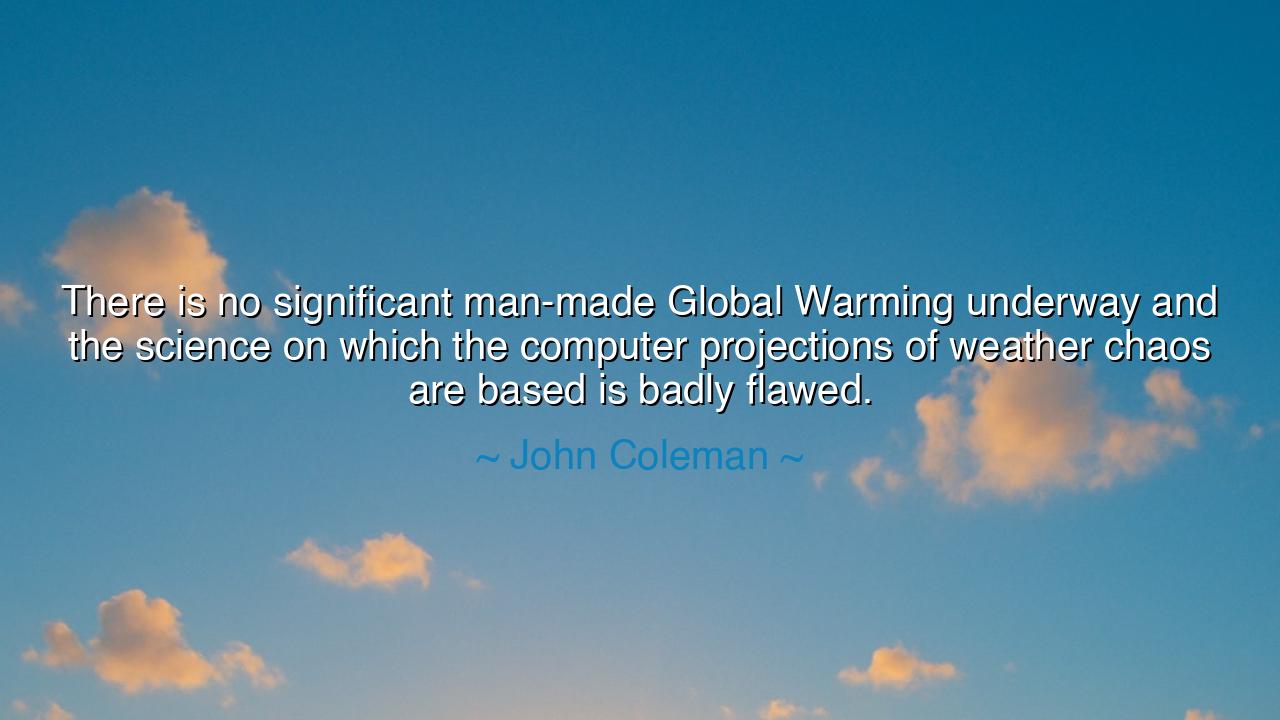
There is no significant man-made Global Warming underway and the
There is no significant man-made Global Warming underway and the science on which the computer projections of weather chaos are based is badly flawed.






Listen, O children of wisdom, for the words of John Coleman carry with them a challenge to the prevailing dogmas of our age, a warning about the dangers of blind acceptance and the importance of critical thinking. "There is no significant man-made Global Warming underway and the science on which the computer projections of weather chaos are based is badly flawed." In these words, Coleman calls us to question the assumptions that have been made about the state of our planet and the forces that shape its climate. He urges us to look carefully at the science behind the projections of catastrophic climate change and to understand that the truth may not be as clear-cut as many would have us believe.
In the ancient world, O children, there were many who sought knowledge about the earth, the heavens, and the natural world through careful observation and reasoning. The ancient Greeks were among the first to develop theories about the nature of the universe, and many of them, such as Aristotle, believed that the earth’s movements and changes could be explained through natural principles rather than through the influence of the gods. Yet even these great minds understood that their knowledge was limited, that their understanding of the world was based on careful observation and not on assumptions. They valued questioning and reason above all, knowing that the pursuit of truth required the courage to challenge what had come before. Just as the ancients questioned the prevailing myths of their time, so too must we question the prevailing narratives of our own.
Think, O children, of the story of Galileo Galilei, who challenged the geocentric model of the universe with the bold idea that the Earth revolved around the Sun. In Galileo’s time, the idea was considered a heresy, for it contradicted the beliefs of the church and the common understanding of the world. Yet Galileo, driven by his observations and his faith in reason, stood firm in his conviction. The lessons from Galileo’s story are profound, for he reminds us that true progress comes from the courage to question the accepted beliefs, to challenge the prevailing wisdom, and to seek the truth, even when the path forward seems uncertain. In the same way, Coleman’s words encourage us to question the assumptions about man-made climate change and to carefully examine the science behind these claims.
The computer projections that have driven the debate about global warming often come with a sense of certainty, promising doom and disaster unless drastic measures are taken. But, O children, Coleman’s challenge is not to deny the existence of climate change, but to call attention to the uncertainties in the science behind these projections. The models used to predict future climates are based on assumptions that may not be entirely accurate, and the evidence they produce is far from infallible. These models, like all human endeavors, are subject to the limitations of our understanding and the flaws in the data we use. Science, O children, is not about certainty—it is about the relentless pursuit of knowledge through testing, evidence, and refinement. And so, when we are presented with grand predictions of weather chaos, we must approach them with the same skepticism that Galileo brought to the claims of his time.
Consider, O children, the work of Charles Darwin, whose theory of evolution by natural selection revolutionized the way we think about life on Earth. Yet even Darwin’s theory, which is widely accepted today, faced great challenges in his time. Many questioned his ideas, for they contradicted the prevailing views of creationism. Yet Darwin’s theory was not based on blind speculation—it was the product of years of observation, evidence, and careful reasoning. Similarly, in the case of climate change, we must carefully examine the evidence and ensure that our understanding of the world is based on sound science, not on assumptions or unverified models.
The lesson, O children, is one of critical thinking, humility, and courage. Coleman’s words urge us to challenge the prevailing narratives and to ask difficult questions about the assumptions that shape our understanding of the world. Science is not about following the crowd or accepting what is most widely believed—it is about seeking the truth, no matter where it leads. The pursuit of knowledge requires the courage to stand alone when necessary, to challenge the assumptions that guide us, and to question even the most widely accepted ideas. This does not mean rejecting the pursuit of knowledge, but approaching it with a healthy skepticism and a deep respect for the uncertainties that always accompany our understanding of the natural world.
So, O children, as you walk the path of discovery, remember that true wisdom lies not in the acceptance of certainty, but in the willingness to question, to examine, and to challenge the assumptions upon which our knowledge is built. Just as Galileo questioned the foundations of the cosmos, so too must we question the foundations of our understanding of the earth. In doing so, we will uncover deeper truths and continue the journey of learning that has always been the hallmark of human progress. Let critical thinking guide you, and may it lead you toward a world built on evidence, reason, and the courage to always seek the truth.






AAdministratorAdministrator
Welcome, honored guests. Please leave a comment, we will respond soon